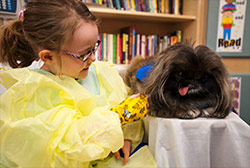Pet Pals program brings joy to hospitalized children
It’s one of the colder, snowier winter evenings, but a 5-year-old lap dog named Elvis couldn’t care less.
Sporting his blue Pet Pals vest with his tongue hanging low out the side of his mouth, Elvis can’t wait to get his paws on the children at the American Family Children’s Hospital. And they can’t wait to get their hands on him.

Pediatric patient Rylee Williams, 4, enjoys the company of Elvis, a Pekingese dog whose tongue often hangs sideways, during a Pet Pals event at the American Family Children’s Hospital. Run by the School of Veterinary Medicine, the Pet Pals program recruits, screens and trains teams of volunteers and their dogs to visit sick children and provide safe canine affection.
Photo: Jeff Miller
Elvis, a Pekingese, is one of 25 Pet Pals dogs. This crew of canines represents the elite few that pass the comprehensive behavior and health tests required to hang out with the pediatric patients.
Run out of the School of Veterinary Medicine, the pet therapy program makes trips to the children’s hospital on Tuesdays and Saturdays, usually with three or four dogs in tow. For the patients, the visits help diminish physical and emotional pain, reduce boredom and anxiety, and make a difficult time a little easier.
The program started in 1996, after a UW–Madison vet student approached veterinarian and instructor Linda Sullivan and dean Chris Olsen about wanting to use her dog to help kids.
After meetings with risk management, pediatricians, allergists and others to assess the feasibility of bringing animals into contact with ill children, the program took a year to set up.
“Any little germ can pose a lethal danger,” Sullivan says. “The good thing is that in partnering with the School of Veterinary Medicine, we’ve got the expertise to know how to deal with that.”
Behavior requires just as much consideration. The screening process starts with a phone call from interested dog owners who think their pet has what it takes.
Sullivan talks to the prospective volunteers to get a feel for their dogs and evaluates those that seem qualified.
“We handle them in just about every way you can imagine,” she says. “We tug on ears, we tug on tails, we pick up their paws.”
Sullivan and the other testers jump around and make a lot of noise to see if the dog joins in. If they do, they may be a bit too rambunctious for the hospital setting.
“Many of our dogs who don’t pass our exam would be wonderful in a classroom of kids,” Sullivan says. “I always tell the owners that the dogs that don’t pass our test have the most fun with the evaluation.”
Once the dogs have proven they can handle the poking, prodding and bouncing, they bring in the kid testers in wheelchairs and hospital gowns to see how the dogs react.
After the dogs demonstrate impeccable behavior, they undergo a physical examination and laboratory screening to assure they are healthy enough to visit the kids. Once accepted into the program, they are required to have twice-yearly health evaluations.
Elvis is one of the estimated one in 15 that was initiated into the program.
“As soon as he puts his vest on at home, he knows he’s coming here,” says Elvis’s owner, Jane Warncke. “He’s just so excited to get here, and that’s his goal. He lives for coming here to see the kids.”
Warncke and her husband have two dogs in the program: Elvis and a 12-year-old Shih Tzu named Bosley.
Elvis was the runt of the litter and was born with a slightly deformed jaw. Warncke suspects that’s the reason his tongue hangs almost permanently outside and to the side of his mouth.
“The kids just think that’s so funny,” Warncke says. “They can come in sometimes not feeling the best and they take one look at Elvis and just start laughing.”
Sullivan suspects that the dogs understand the magnitude of being a therapy canine. She says Pet Pals owners often report that their dogs are much more rambunctious at home than they are at the hospital.
“It’s as if they know they have a job to do,” she says.
And they do it well.
“The interaction between the kids and the dogs is very, very special,” Sullivan says. “You see kids’ eyes light up, you see them smile. We’ve had many parents come up to us and say, ‘This is the first time I’ve seen my child smile in a week.'”
For 4-year-old Rylee Williams, the Pet Pals visits remind her of her home before she got sick a year ago.
Rylee, who lives in Middleton, has been in the hospital on and off since last January, when her parents had to give away their dogs because of the health threats they posed to her daughter.
“No matter what’s been going on throughout her day, as soon as she gets here she’s happy,” says Rylee’s mom, Sara Williams. “She just wants to love them as much as she can in the little time she sees them.”
Pet Pals also seems to bring out the best in her.
Although Rylee is enjoying Elvis’s company, as soon as they roll in 13-year-old Joey Mullens from Friendship, who is not yet able to get out of bed, Rylee tells the nurses, “This doggie wants to visit him.”
Joey has only been at the children’s hospital for a couple of days, and this is his first visit with the Pet Pals dogs.
“Usually it’s boring [here] but this is something different,” he says, adding that it’s nice “to have somebody else but me in my bed.”
His mom, Angelic Mullens is also excited about the program.
“For any kid, animals are supposed to be really good,” she says, “Takes your mind off things. Somebody else to play with for awhile.”
The program was initially funded by a grant from the Companion Animal Fund. Pet Pals has also received grants from several rotary clubs in the Madison area, the Evjue Foundation and more. They continue to fundraise to support the program.
For more photos and a short audio story about the program, visit: http://www.news.wisc.edu/newsphotos/petPals10.html
Editor’s note: This story is part of a series of stories about the Wisconsin Idea. Find more at http://www.wisconsinidea.wisc.edu.
Subscribe to Wisconsin Ideas
Want more stories of the Wisconsin Idea in action? Sign-up for our monthly e-newsletter highlighting how Badgers are taking their education and research beyond the boundaries of the classroom to improve lives.

